
English (961)
Children categories
Contact road safety programme
Head office
BRAC Road Safety Programme (6th floor)
BRAC Centre, 75 Mohakhali, Dhaka – 1212
Phone: 88 02 9881265, Ext. 3116, 3117
BRAC Driving School ( Ashkona, Uttara )
BRAC Learning Centre (Opposite of Dhaka International Airport and Hajji Camp)
Dhaka – 1230
Phone: 88 02 8954285, Ext. 123, 124
Mobile: 88 01729070562, 88 01730348531, 88 01730348543, 88 01787669655
BRAC Driving School ( Gulshan )
Tejgaon Link Road (Niketon, Gate: 03)
Gulshan, Dhaka.
Mobile: 88 01729071899, 88 01730347157
BRAC Driving School ( Uttara R/A )
House-13, Road- 12, Sector- 12,
Uttara, Dhaka.
Mobile: 88 01730348543, 88 01730348531
Email: This email address is being protected from spambots. You need JavaScript enabled to view it. , This email address is being protected from spambots. You need JavaScript enabled to view it. , This email address is being protected from spambots. You need JavaScript enabled to view it. , This email address is being protected from spambots. You need JavaScript enabled to view it.
Research and publications of road safety programme
Research reports
- Research Report: Road Safety in Bangladesh - Ground Realities and Action Imperatives [Download]
- Action Research Report: Promoting Road Safety through Community Education Programme [Download]
- Research Report: Heavy Vehicle Drivers in Bangladesh - An Ethnography [Download]
Programme reports
- Project Completion Report: Road Safety Public Awareness Campaign on Dhaka-Sylhet Highway [Download]
- Project Completion: Report Road Safety Awareness Campaign in Bangladesh with special focus on Patuakhali - Amtoli Road [Download]
- Annexes of Project Completion Report: (Volume-II) Road Safety Awareness Campaign in Bangladesh with special focus on Patuakhali - Amtoli Road [Download]
- Project Completion Report: Road Safety Awareness Campaign for School Students under LGEDs RIIP-RDP-25 in Barisal and Khulna Division [Download]
- Seminar Report: Launch of International Guidelines on CRSE [Download]
- Workshop Report: Road Safety Public Awareness Campaign on Dhaka-Sylhet Highway A GO-NGO Collaboration [Download]
Publications
After detailed consultation with professionals, community members and field tests at campaign areas, BRAC developed IEC materials and used those in multiple road safety campaigns. We have produced different posters and a flipchart to disseminate them widely with road safety institutions, educational institutions, CBO's and NGO's for use in their road safety training activities. In some project areas, billboards carrying road safety messages were installed. Others included the development and broadcasting of road safety advertisements on national television.
- Flip chart: A 14 page well-researched colourful flip chart has been prepared and is being used for pedestrian, children, community and drivers education on road safety.
View flip charts developed by BRAC - Poster: Three posters have been produced on awareness of pedestrians and proper use of road engineering facilities.
View posters developed by BRAC - Billboard: A total of 12 large billboards containing road safety messages and instructions have been designed and installed at 12 important spots beside Dhaka-Sylhet and Barisal-Kuakata highway.
- Video training material:
- A 19 minute video training film was produced for road safety awareness of pedestrians and public transport passengers. The film is being used for the education of roadside communities with the help of multimedia projectors.
- A 44 minute video film was produced for road safety training of commercial vehicle drivers. The film is being used for road safety awareness of drivers at transport terminals.
- Baro Bidhi (12 Rules): A set of 12 do’s and don’ts has been prepared for over 4500 motorcycle riding field workers of BRAC.
- Reflective stickers:
For making rickshaws visible at night, honeycomb reflective stickers were used. The highly visible stickers were pasted on the backs of rickshaws and rickshaw vans. - Animation films:
An animated film on road safety titled “Lal, Holud aar Shobuj (Red, Yellow and Green)” was created and piloted on local cable TV channels in 2004. Under World Bank’s Road Rehabilitation and Maintenance Project - III, another four episodes were produced and aired on the state run Bangladesh Television (BTV) in 2005. With further support of the Royal Danish Embassy, four more episodes were produced and aired on BTV in 2007.
- Booklet for quiz competition:
A booklet on how to behave safely on the road was developed for students. The students were quizzed later based on their learnings. - Booklet for professional motor vehicle drivers:
Designed for in-service drivers, the booklet aimed to help them remember the knowledge that they have gained at the training. As many of them are illiterate, the booklet is mostly illustration based with supplementary texts.
- Road safety campaign videos:
Recognitions of road safety programme
- In 2016, BRAC became the first NGO from Bangladesh to become a member of Global Alliance of NGOs for Road Safety, for its educational and advocacy activities on road safety.
-
In line with National Road Safety Strategic Action plan of 2011-2013, Bangladesh Road Transport Authority (BRTA) requested BRAC to identify opportunities in the national curriculum for inclusion of road safety messages. BRAC's road safety programme conducted a gap analysis and proposed road safety lessons for incorporation in pre-primary and secondary educational level.
The National Curriculum and Textbook Board (NCTB) accepted BRAC's proposal and included road safety lessons in e-books for different classes and subjects in 2015. It is expected that NCTB will adopt these lessons in the upcoming textbooks of the national curriculum.
- BRAC has been made Supra National iRAP member in July 2011. International Road Assessment Programme (iRAP) supported by FIA Foundation, UK is a non-profit organisation dedicated to work for road safety through partnership with government and non-government organisations.
- The NGO Affairs Bureau of the Prime Minister’s Office has formed a committee on 01 January 2009 to prepare short and long-term programme on traffic safety for NGOs. BRAC has been made Member Secretary of the committee.
- The director in charge of road safety programme, Mr Ahmed Najmul Hussain has been awarded the prestigious Prince Michael International Road Safety Award, UK in 2002 in recognition of his commitment and innovative initiatives towards improving road safety in Bangladesh.
- The Ministry of Communications of the Government of Bangladesh made BRAC a member of the National Road Safety Council (NRSC) for its programme to improve road safety in the country.
- Mr Ahmed Najmul Hussain has been included as a member in the National Committee formed by the Government on National Committee for Enhancing Mobility and Skills. The committee is involved in making BRTA (Bangladesh Road Transport Authority – the lead Government road safety coordinating and policy-making agency) more effective.
Community road safety interventions
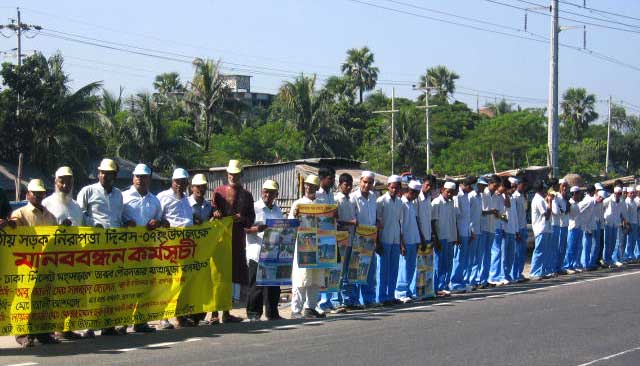
The tragic death of Billal (from Betila ward in Manikganj, Bangladesh)
Billal (aged 6) was playing with his friends on the side of road. His uncle called to him from across the street. As Billal began to cross, a motorised three-wheeler hit Billal and threw him about three meters away. Billal suffered injuries on his head and different parts of his body, eventually succumbing to death on the way to Manikganj Hospital. The driver tried to flee but was caught by local people and handed over to the police. The driver (a local) apparently had a history of causing serious accidents beforeheld no valid license.
One accident not only disabled Baten Mian, it disabled lives of his family as well
With a crutch stuck firmly under his arm, Baten Mian runs a tea stall in Gazipur district. After carelessly getting down from a tempo (three wheel human hauler), he was trampled by a speeding truck. Baten was lucky to survive, but he lost a leg. All his wealth and savings were spent for his treatment. The tea stall he set up by borrowing money is providing subsistence to seven dependents including four children.
Evolution of community safety approach
In 2004, BRAC, in collaboration with Transport Research Laboratory UK, conducted a community based action research in the community of Betila in Bangladesh. It was done to identify a cost-effective and good practice guideline in order to carry out road safety community education programmes in developing countries.
The study observed behaviour of local pedestrians, held in-depth individual and household surveys and FGDs with different segments of the community and on existing accident records. The community was engaged to identify the pressing road safety problems and prompted to suggest awareness raising mechanisms that they deemed effective. A ‘before and after intervention’ evaluation process was also applied to see the impact of interventions in improving pedestrians’ knowledge and behaviour.
This action research laid the groundwork for BRAC Road Safety Programme's approach to community based projects.
Download the research.
BRAC driving school
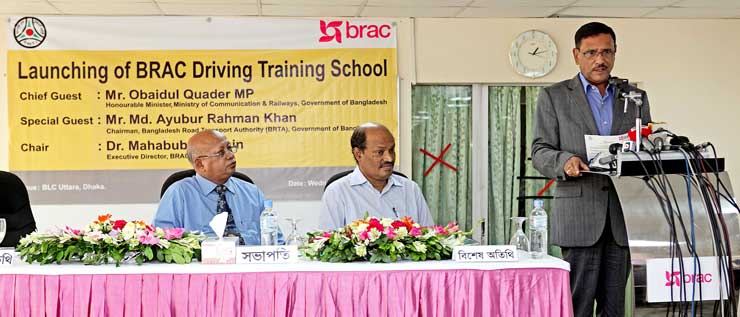
History: In 2011, fifty school children and two prominent media personalities of Bangladesh were killed in separate incidents of road crashes. The events spurred nationwide outcry and prompted the government to convene an emergency meeting of the National Road Safety Council (NRSC) in that year. Considering the dismal state of drivers training in the country, the meeting came to conclude that BRAC among other organisations, in joint collaboration with Bangladesh Road Transport Authority (BRTA), will train driving instructors and provide road safety training to in-service drivers.
BRAC Driving School was launched in 2012 as a feasible measure to tackle the alarming increase of road fatalities over the years. BRAC commissioned Hubert Ebner (India) Pvt Ltd to prepare training materials and conduct the Training of Trainers (TOT) for the driving trainers recruited by BRAC. The school uses contemporary driving training technologies such as, driving simulators, visual impairment system, and P-Drive (digital driving testing device) to train the students.
BRAC Driving School primarily has two training programmes which are Shurakkha (defensive driving training) for commercial vehicle drivers and basic driving for the general public. Besides, the programme took up a project called Four Wheels To Freedom which trained 75 professional female chauffeurs to provide them with an income generation tool.
Driver's training for women
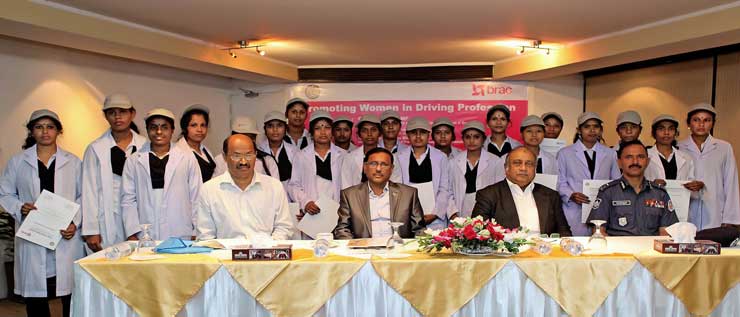
Women empowerment is deeply rooted in BRAC's values and is also reflected through BRAC Driving School. The project 'Four Wheels to Freedom' was initiated with the target to include women in driving profession and to provide an income generation skill to poor, disadvantaged women who would otherwise spend their life managing their households.
Under the project, a total of 75 women chauffeurs were trained through a two-month long residential training. After completion, they were presented with BRTA approved professional driving licenses, and today they are employed at reputed INGOs, MNCs, banks and other institutions in Bangladesh.
Shurakkha - defensive driving training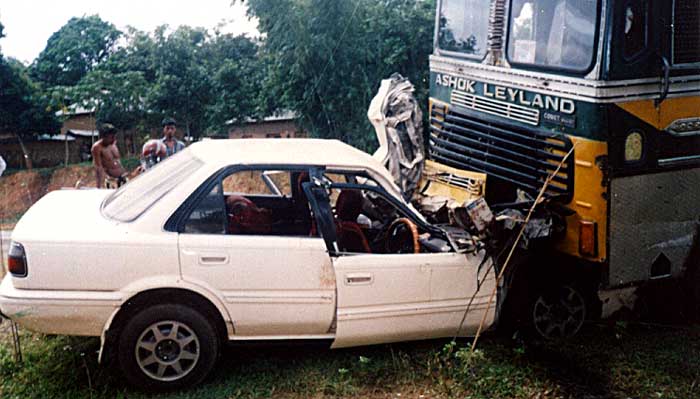
As the 2012 NRTA report stated, 1263 fatal road accidents saw the involvement of heavy vehicles on that year. The highways of Bangladesh see a major proportion of vehicular accidents that involve buses, goods carriers, human haulers and other types of heavy transport.
No matter how safe the vehicles or the vigilance of the general people, road safety cannot be achieved without driver’s training, skill and right attitude to drive safely. In light of this, BRAC Road Safety Programme introduced Shurakkha - a training targeted towards in-service commercial bus and truck drivers, majority of whom have not been through institutional driving training. It is common in Bangladesh where such drivers receive their training through apprenticeship from another experienced but uncertified driver. As a result, most of these drivers, although performing at professional capacity, are unaware of the many road safety rules and practices. This training is also fully residential.
Case stories:
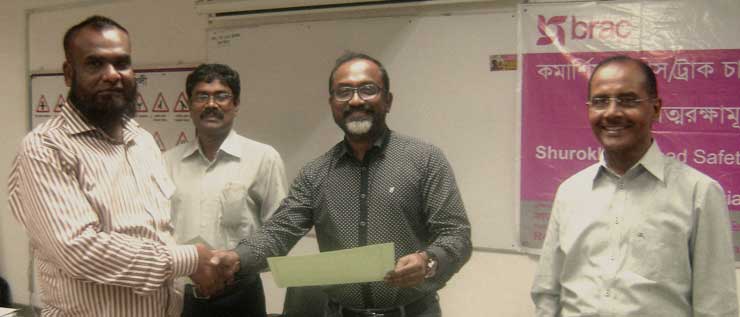
"The fuel consumption of the vehicles dropped by 30 per cent after our drivers took this training." - Mohammad Faruk Talukder Sohel (second from right), managing director, Shohagh Paribahan
"I've been driving professionally for ages but had no idea that there are so many things to consider while driving. Had I received this training earlier, I'd have been more careful." - Md. Abdus Sobhan, truck driver
"Once I fell asleep while driving and crashed into a roadside public event killing some people. Through this training I realised the importance of proper resting before driving." - Md. Ataur Rahman, truck driver
"I was involved in an accident where I collided with an auto-rickshaw and its driver passed away. All this time I believed it wasn't my fault. After the training, I understood that the cargo wasn't properly fastened to my truck. So, my truck took more distance to stop which resulted in the accident." - Md. Faisal Khondoker, truck driver
"I used to think that the white marks on the road bore no significance. From this training I understood what they mean. We must not overtake and drive on the other side." - Md. Monir, mini-bus driver
Basic driving training
Since November 2012, BRAC Driving School made its basic driving training facilities accessible for all. Anyone interested to take proper driving lessons under expert guidance are encouraged to get enrolled.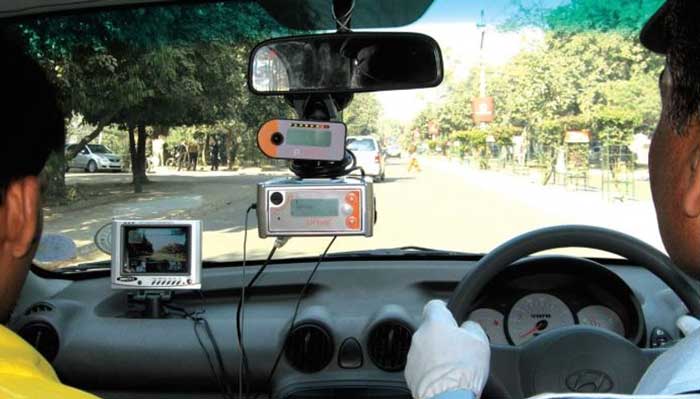
Training conducted with the P-Drive system
- Twelve days of residential Training of Instructors (TOI) for instructors of private driving training schools
- Thirty five days of non-residential basic driving training for all to obtain both professional and non-professional driving license
Facilities available:
- Modern driving simulator
- Visual impairment system
- Seatbelt convincer
- Dual controlled training vehicles
- P-Drive
Training of instructors
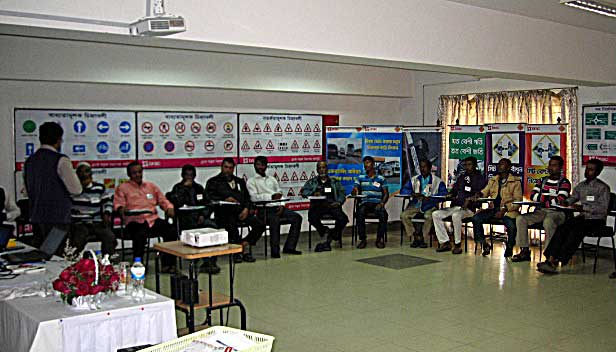
BRAC's monitoring department carried out a survey about the state of driving schools and driving instructors in the country, with the following findings. There were 362 driving training schools and 418 driving instructors in Bangladesh in 2012. Of these instructors, less than 108 had a legally required instructors license. BRAC Driving School introduced this training to fill the gap in terms of improving the quality of driving instructors in the country.
The school ensures that the trainee driving instructors know everything in order to conduct driving training: basic knowledge on driving, knowledge on road safety, and how to transfer their knowledge to their trainees. Driving instructors learn various tools, techniques and methods from this training.
These are some remarks on the training by former trainees:
“According to me, all the trainers of the entire country should do this course. If I didn’t receive this training, I would not have known that there is such a great training facility in Bangladesh.” – Al – Haj Mohammad Nurul Islam, trainer
“This course of BRAC is extraordinary. If this course is continued, it could bring about positive change in the professional driving arena of Bangladesh.” – SM Alamgir Hossain Babul, trainer
“The equipments they used and the training we received were marvelous. I think every trainer needs this type of training.” – Md. Salim Reza, trainer
“This type of training should be given to us once every year. My entire attitude has changed after coming here, thanks to BRAC.” – Md. Moshur Alam, trainer
“There is nothing more to say about this course, because it already is outstanding. I would like to say that the management should think about increasing the duration of this course to 15 days.” – AKM Fazlul Haque, trainer
BRAC Driving School signed an MOU with BRTA whereby trainees upon completion of the TOI training at the school can receive a driving instructors license from BRTA. Trainees of the course are taught in batches numbering 16 to 20 drawing resource persons from outside. Duration of this residential course is 12 days.
Address:
BRAC Learning Centre Uttara (Opposite of Hazrat Shahjalal International Airport and Hajj Camp), Dhaka – 1230
Mobile: 8801730374499, 8801730348531
BRAC Driving School (Gulshan)
Tejgaon Link Road (Niketon, Gate: 03), Gulshan, Dhaka- 1212.
Mobile: 8801704166301, 8801729071908
BRAC Driving School (Uttara R/A)
House-13, Road- 12, Sector- 12, Uttara, Dhaka- 1230.
Mobile: 8801713158265, 8801729070989
BRAC Driving School (Chattogram)
Choto Pole, Agrabad Access Road, Agrabad, Chattogram- 4100
Mobile: 8801891454899, 8801730347157
BRAC Driving School (Jashore)
Kathal tala main road (west side of Bablatala bridge), Sadar, Jashore- 7401
Mobile: 8801730322015, 8801773989899
BRAC Driving School (Rajbari)
Kallyanpur main road, Sadar, Rajbari- 7711
Mobile: 8801717809648, 8801729070562
Email: This email address is being protected from spambots. You need JavaScript enabled to view it. , This email address is being protected from spambots. You need JavaScript enabled to view it.
Road safety programme overview
As per the estimation by the World Health Organization, over 21,000 deaths occurred from road crashes in Bangladesh in 2015 with road traffic crashes equating to an estimated 1.6 per cent loss to the nation's GDP. The number of reported traffic fatalities per 100,000 population was 2.1048 in Bangladesh in 2013 (with 3,296 reported traffic fatalities and a population of 156,594,962). Furthermore, most affected families are driven into poverty from the loss of a family member who was a source of earning. BRAC's road safety programme identified key areas in Bangladesh where communities are exposed to risk of road accidents. These communities live very close to or beside the major highways. As part of engaging the communities, the programme activated several campaigns to raise awareness and help develop a sense of ownership of its own road safety.
Community road safety
In 2000, the government of Bangladesh requested BRAC to complement its efforts to improve road safety in the country. In 2001, BRAC decided to fullfill this request, both for the sake of the country and to protect its staff and programme participants. We chose to build road safety awareness, partly because of the insufficiency of road safety education in the formal education curriculum and the provision of information being passed along via word of mouth. Our approach was to involve the local communities, build their road safety capacity and road safety ownership, because our organisational experience has taught us that local ownership of development initiatives is crucial for achieving the desired outcome. As community road safety education is relatively new in the world - especially in developing countries, BRAC is a pioneer in community road safety initiatives in Bangladesh.
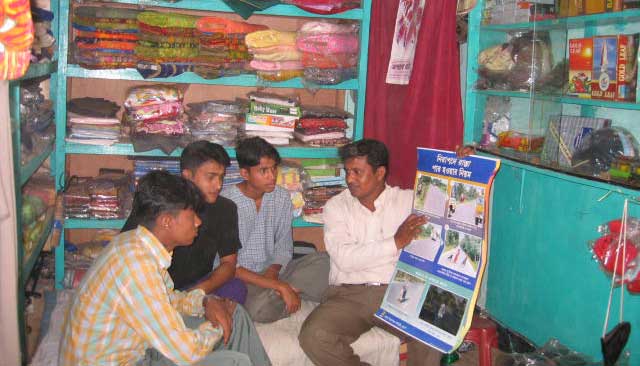
In 2003 BRAC was approached by UK’s Transport research laboratory (TRL) to carry out an action research project in community road safety education. By consulting local communities on their road safety problems, causes, solutions, preferred methods and messages for builing awareness, we designed a community road safety programme. The pilot project was done in partnership with TRLat Betila, and the project was very successful in making pedestrians aware of safe walking and crossing rules. This was the genesis of BRAC's road community road safety initiative and since then, (in consultation with local communities) BRAC has been improving the programme and have created new components while customising it to the needs of the particular communities.
Read more.
BRAC Driving School
The road safety related skills and attitude of drivers are huge factors determining public safety on roads. BRAC Driving School was started because there was a lack of good training facilities for in-service drivers, driving instructors, and novice drivers.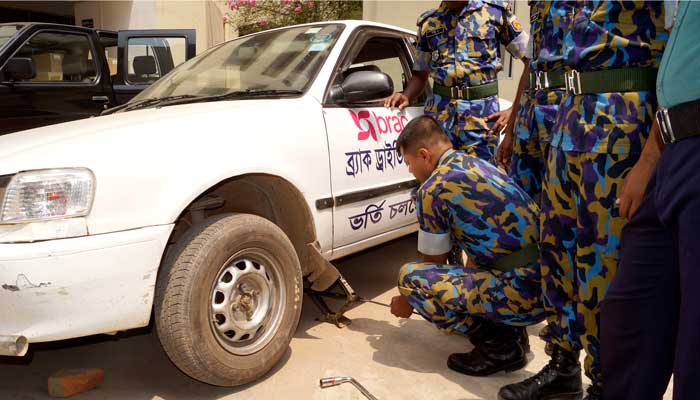
BRAC Driving School, a modern driving school in Bangladesh, was launched in 2012 by BRAC’s road safety programme. Earlier in 2011, in a meeting of the National Road Safety Council (NRSC), a decision was made that BRAC will take up a driving training project to train driving instructors and provide road safety training to in-service drivers considering the dismal state of drivers training in the country. After that, BRAC with the technical support of Hubert Ebner (India) Pvt Ltd prepared training materials and conducted the training of trainers (TOT).
Read more.
Advocacy: Promoting Safe Road Code project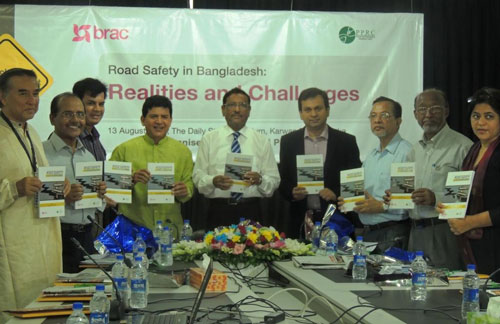
Together with BRAC's advocacy for social change programme, the road safety programme has also worked on an advocacy project called 'Promoting Safe Road Code’. In this three year project (2013 – 2015) it was proposed that a safe road code would be drafted in consultation with relevant stakeholders and experts to be promoted afterwards. This code would describe important rules and regulations which should be followed by all road users. However, during the project the government of Bangladesh designed and considered new traffic laws (RTA), after which the safe road code was held redundant by BRAC. As a result, instead of the safe road code, the great importance of road safety in general was promoted. BRAC also organised some national level discussions to improve the proposed road traffic act (RTA). Another major activity was conducting a research on road safety carried out by Power and Participation Research Center (PPRC). A higher goal of the project was to create an enabling environment for the road safety programme. As communities, local and national policy makers, other authorities, and service providers such as the BRTA have been sensitised on and mobilised for road safety, future activities of the road safety programme can receive more support.
We mourn for Dr Babar Kabir

BRAC mourns the sad demise of Dr Babar Kabir who was the former senior director of BRAC's disaster management and climate change and water, sanitation and hygiene programmes. On the morning of 15 January at around 7 am, after a severe asthma attack, he succumbed to a cardiac arrest in Dhaka. He is survived by his wife and two daughters.
Dr Kabir completed his PhD in hydrogeology in 1986 from Azerbaijan State University and has been working in the field of environment and public health since then. He has served in the capacity of senior management roles at the World Bank-WSP, UNDP Bangladesh, Ministry of Environment and Forest, Government of Bangladesh as national programme coordinator for their Sustainable Environment Management Programme (SEMP), and other multilateral and bilateral organisations. In 2007, Dr Kabir joined BRAC as director of its water, sanitation and hygiene (WASH) and disaster management and climate change (DMCC) programmes, and in 2012 he became a senior director. He was also a member of the Executive Management Committee, which is BRAC’s management decision making committee.
Hinged on his leadership, BRAC provided more than 37 million people with hygienic sanitation and another two million with access to safe water in 250 sub-districts of Bangladesh. And in 2013, after the Rana Plaza disaster, BRAC reached out to number of survivors through health protection scheme, fixed deposit, skills development training for different livelihood followed by seed funding as investment to begin new life and psychosocial counselling to cope with post-traumatic stress disorder.
In 2014, Dr Kabir left BRAC to become a consultant in the WASH and microfinance sectors. He has over 15 publications in national and international journals and has co-authored a chapter on ‘Mitigation Strategies’ of the WHO monograph on arsenic initiated by UNACC.
Today, the BRAC family is deeply saddened by the departure of such a dynamic leader and a brilliant mind that came out of this nation.
The Story Behind the 2015 World Food Prize Laureate
When the non-profit BRAC was set up over 40 years ago, it was a temporary effort aimed at helping rural populations that had been affected by a devastating cyclone and civil war. Today, BRAC is one of the biggest NGOs in the world, and responsible for lifting 150 million people out of poverty. Farming First TV had the opportunity to interview BRAC’s Founder, Sir Fazle Hasan Abed at the Borlaug Dialogue in Iowa, where he was honoured as the 2015 World Food Prize Laureate, to find out the secrets of success behind the Bangladesh-based NGO.
For centuries, Bangladeshi farmers had faced a hunger season, known as monga. Sir Fazle told Farming First how giving farmers access to rice varieties that matured more quickly allowed a third crop, potatoes, to be planted in between the two rice growing seasons. “It was long assumed to be a part of the enduring fabric of rural life in northwest Bangladesh. But today, we are starting to see the disappearance of monga and, in many places it has gone completely,” he commented.
“We have…succeeded in disrupting a pattern of suffering that had prevailed for centuries”
Providing farmers with finance and access to markets in order to sell their produce, was a second strand of activity that BRAC undertook in order to help rural people prosper. Sir Fazle told us how he had seen that farmers in rural areas were not getting a fair price for their milk.
“I thought, if we could collect milk… refrigerate it, and transport it to Dhaka, we could easily pay (the farmer) 15 taka per litre — roughly twice what she was getting at that time — and still cover our costs. This led to the establishment of the BRAC Dairy enterprise.”
BRAC now operates several social enterprises, that are all focussed on providing high quality inputs and services for the poor. These businesses generate $150 million in profit each year, which is all directed into financing BRAC’s non-for profit work such as healthcare and education.
For more information on Sir Fazle Hasan Abed and BRAC’s work, visit the World Food Prizewebsite.
BRAC awards 10 journalists for reporting on Migration
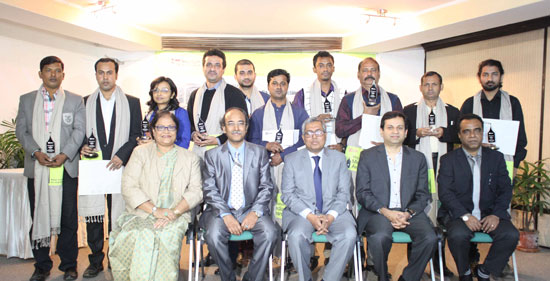
BRAC awarded 10 journalists from local and national media at an event in the capital today. BRAC Migration programme organised this event at BRAC Centre in recognition of media’s contribution in raising mass awareness on migration, migrant’s rights and welfare. This initiative was taken for the first time to acknowledge and encourage journalism in migration sector.
10 journalists from print, online and electronic media received the award from BRAC’s executive director Dr Muhammad Musa. A jury board of four members selected the winners on the criterion of raising public awareness, advocating for the rights, welfare and well-being of Bangladeshi migrant workers and their families. promoting a positive image of Bangladeshi migrants and creativity, originality and innovativeness of the content. The jury board members did not include any BRAC staff to maintain impartiality.
From the national print media category first, second and third positions were secured by Md Shariful Hasan of Prothom Alo, Md Abid Ajad Shuvo of Dhaka tribune, Belal Hossain Biplob of The Daily Star. The winners of local level category are Abu Bakar Siddiq (3rd) of Daily Jalalabad, Sylhet, Aftab Hossian (2nd) of Mayabazar, Rangpur; and Mohammad Sarif Eqbal (1st) of Laal Shobujer Desh, Khoj Khabor and Daily News, Narshingdi. Md Rabiul Islam of migrationnews.bd.com received the award in the online media category. From the electronic media category first, second and third were Salah Uddin Helali from Jamuna TV, Keramat Ullah Biplab from ATN Bangla and Jhumur Bari from 71 TV.
The keynote presentation was delivered by programme head of migration programme, Mr Hassan Imam before the award ceremony took place. Highlighting media exposure on migration he said, “Steps have been taken internationally and nationally to stop irregular migration through sea-root after substantial reporting in media.”
Present as special guest one of the jury board members, Joint Secretary of ministry of expatriates’ welfare and overseas employment Mr Kazi Abul Kalam said, “Bangladesh Government has recently rewarded BRAC for its significant work in migration sector. A special thanks to media for its strong role in bringing out stories of migrant workers in 2015. From Government, we are setting up a hotline number with the help of A2I for the migrants all over the world. We hope we will get all cooperation from media and civil society to help migrants in future.”
Appreciating media’s role in this sector BRAC’s ED Dr Musa said, “Collective effort by civil society, media and government can create a constructive movement to ensure migrant’s rights and their wellbeing. This award is our respect to media for their constructive and substantial role to ensure safe and quality migration.”
The event was moderated by BRAC’s senior director of strategy, empowerment and capacity Mr Asif Saleh. Director of BRAC’s gender, justice and diversity and migration programme was also present along with representatives from media, civil society and development organisations.
We mourn for Mahabub Hossain
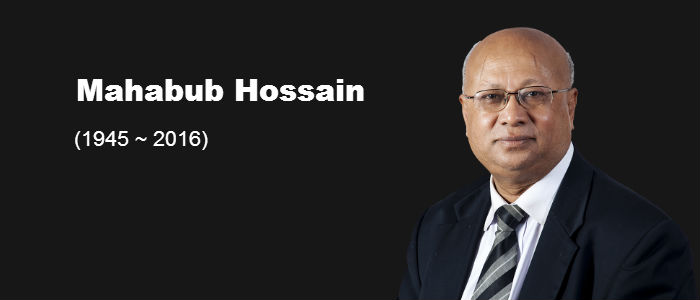
BRAC deeply mourns at the sad demise of Dr Mahabub Hossain, advisor of the executive director, BRAC and Distinguished Professor and Chairperson, Economics and Social Science department of BRAC University. He passed away on January 4, 2016, at 2.45 am (Bangladesh time) in Cleveland Hospital, USA at the age of 71. He left behind his wife, two daughters and a son.
In a life filled with brilliance, this eminent economist served as head of social science division of International Rice Research Institute (IRRI), Executive director of BRAC, and Director General of Bangladesh Institute of Development Studies (BIDS). An inspiring figure, he will be forever remembered for his brilliance in articulation of macro- economic analysis, his path breaking research works, his leadership in agricultural innovation and above all his deep empathy for the marginalised people.
After completing his Masters in Economics from Dhaka University, Dr Hossain obtained his PhD from the Cambridge University. Besides the publications of many research articles in international journals, some of his seminal books are: Asian Rice Bowls A Returning Crisis: Rice Research in Asia: Progress and Prospects; Impact of Rice Research in Asia; Strategy of Development in Bangladesh; Rural Economy and Livelihoods Insights from Bangladesh, Bish Geramer Golpo, Leading Issues in Rural Development. The global magazine of politics and economics-The Foreign Policy featured him in their list of 500 most prominent individuals in the international arena.
He was suffering from heart disease for last two years. He went to USA on 15 December 2015 for treatment purpose. He took his last breath at the operation table last night.
On his demise, BRAC founder and chairperson, Sir Fazle Hasan Abed said, “Very few people globally had the depth of understanding of development issues like Dr. Mahabub Hossain. His life was a story of success against all odds and during his time at BRAC, he had a persistent focus on creating opportunities for the poor. His research over many decades on proliferation of innovation in agriculture and livelihood improvement of marginalised farmers has been path breaking. We, his BRAC family, mourn today this irreparable loss with his friends, family and many people he touched during his life dedicated to public service.”
Join the world’s biggest family




